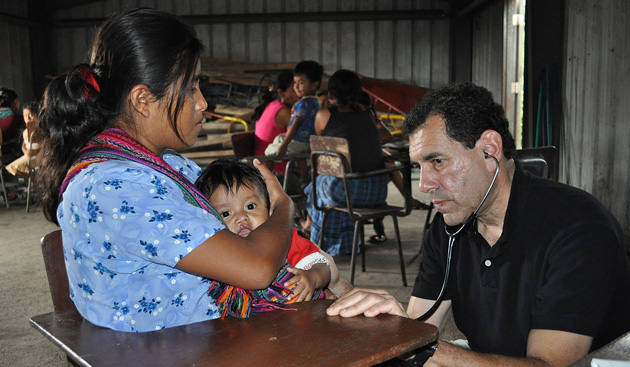

Freeman Spogli Institute Fellow and pediatrician Paul Wise heads the Children in Crisis program, which blends Stanford's expertise in medical research and international studies to provide care in places like Guatemala. (Adam Gorlick)
International Initiative
Stanford’s influence expands, thanks to International Initiative
Stanford’s international influence was reflected in 2010 in the creation of programs to curb nuclear weapons, understand food security issues and use technology to improve society; visits by world leaders; and expansion of overseas study programs.
All are evidence of the success of Stanford’s International Initiative, launched in 2005 to focus interdisciplinary teaching and research on three areas: peace and security, governance at all levels and human well-being. Its co-directors are Coit Blacker, director of the Freeman Spogli Institute for International Studies and the Ken Olivier and Angela Nomellini Professor in International Studies, and Elizabeth Paté-Cornell, the Burt and Deedee McMurty Professor in the School of Engineering.
Freeman Spogli Institute as initiative hub
The Freeman Spogli Institute for International Studies (FSI) is the hub of the initiative and home to dozens of centers and programs that apply Stanford expertise to solving some of the world’s most challenging problems. Among the work of the initiative this year:
- William Perry, former secretary of defense and the Michael and Barbara Berberian Professor, Emeritus, and Siegfried Hecker, former director of the Los Alamos National Laboratory, announced the Nuclear Risk Reduction initiative under the auspices of the Center for International Security and Cooperation to address the changing nuclear threat following the end of the Cold War and the rise of international terrorism.
- FSI’s Conference on Technology, Governance and Global Development hosted Bill Gates as the Frank E. and Arthur W. Payne Lecturer, speaking about “Giving Back: Finding the Best Way to Make a Difference.” The conference launched the Global Underdevelopment Action Fund to promote interdisciplinary research on global underdevelopment and poverty alleviation. The fund has made six awards to faculty and scholars across campus.
- Political economist Francis Fukuyama was appointed an FSI senior fellow and anthropologist Thomas Blom Hansen was appointed to the International Initiative’s provostial chair in South Asian studies. Fukuyama has written on democratization and political and economic development, including The End of History and the Last Man. Hansen, who will serve as director of the Center for South Asia, is known for research on local politics, the state, religious and political violence, and democracy, especially in India.
- The Program on Liberation Technology was launched by Joshua Cohen, the Marta Sutton Weeks Professor of Ethics in Society; Larry Diamond, senior fellow at the the Freeman Spogli Institute and Hoover Institution; and Terry Winograd, professor of computer science, to investigate how information technology can be used to defend human rights, improve governance, empower the poor and promote economic development. The program is under the auspices of the Center on Democracy, Development and the Rule of Law.
- The U.S. State Department awarded $1.3 million to support the work of the Afghan Legal Education Project, a joint program between the Law School’s Rule of Law Program and the Center on Democracy, Development and the Rule of Law. The project, started by two law students, has written four textbooks for law students in Afghanistan.
- Stanford Global Health, directed by School of Medicine Senior Associate Dean Michele Barry, received an $8 million National Institutes of Health grant to create a Consortium in Innovation, Design, Evaluation and Action to accelerate progress in the interdisciplinary development of affordable diagnostics, drugs and devices. It also earned a $10 million grant to help improve medical education at the University of Zimbabwe.
Attracting world leaders
Stanford’s influence on global affairs helped attract such visitors as German Chancellor Angela Merkel, who spoke to a packed Dinkelspiel Auditorium audience about international cooperation and technological research, and Russian President Dmitry Medvedev, who spoke about encouraging innovation and technology in his country.
Russian President Dmitry Medvedev came to Stanford to talk to students and faculty and to meet with a group that included former secretaries of state Condoleezza Rice and George Shultz, both affiliated with the Hoover Institution.
Also in 2010, Stanford opened its new Bing Overseas Studies Cape Town campus, which introduces students to post-apartheid South Africa, with an emphasis on health-focused community development. At the Stanford Center in China, ground was broken in August on a new facility on the campus of Peking University.
